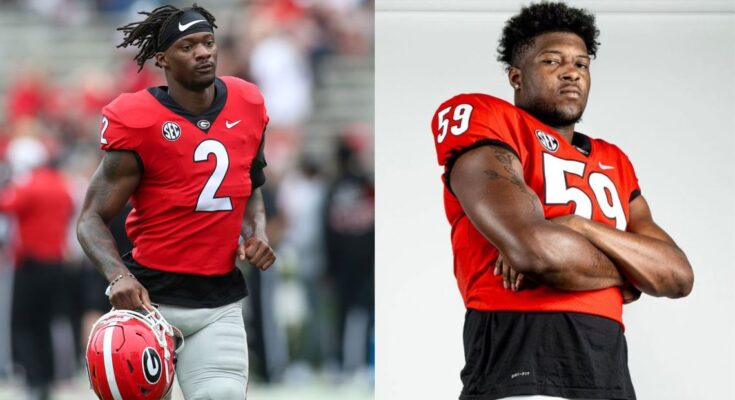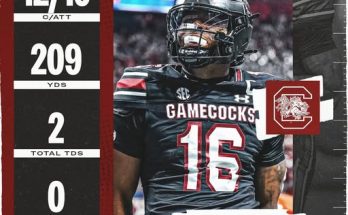Georgia Football Program Faces Renewed Scrutiny After Latest Player Arrests
The University of Georgia football program finds itself in familiar yet uncomfortable territory after two players were arrested within 48 hours this week, reigniting concerns about discipline and accountability within Kirby Smart’s back-to-back national championship program. Starting linebacker Jamon Dumas-Johnson, a key figure in Georgia’s historic defense, turned himself in to Athens-Clarke County authorities Wednesday morning on reckless driving charges following an alleged street racing incident that left a teammate’s sports car totaled. His arrest came just one day after reserve offensive lineman Jonathan Jefferson was booked on felony drug possession charges after police discovered nearly a pound of marijuana and several THC vape cartridges during a routine traffic stop near campus. These back-to-back incidents mark the seventh and eighth arrests involving Georgia football players since the Bulldogs hoisted their most recent national championship trophy in January, raising difficult questions about whether success has come at the cost of institutional control.
The details of Dumas-Johnson’s case paint a particularly troubling picture for a program that has emphasized leadership and accountability. According to the police report obtained by local media, officers responded to a two-vehicle collision on Baxter Street at 2:37 a.m. Tuesday where a Dodge Challenger—later determined to be driven by freshman defensive back Marcus Washington—had flipped onto its roof after allegedly racing Dumas-Johnson’s Dodge Charger. Witnesses told investigators both vehicles were traveling “well over 100 mph” in a 45 mph zone when Washington lost control. While Dumas-Johnson wasn’t present when police arrived, body camera footage shows Washington telling EMTs “we were just messing around” before being transported to Piedmont Athens Regional with non-life-threatening injuries. The senior linebacker turned himself in the following morning after arrest warrants were issued, with the Athens-Clarke County Police Department confirming they’ve recommended street racing charges—a misdemeanor that carries up to 12 months in jail—to the district attorney’s office.
Jefferson’s arrest presents different but equally serious concerns. The 6’4″, 310-pound redshirt sophomore was pulled over Monday evening for a broken taillight when officers reported smelling “a strong odor of burnt marijuana.” A subsequent search allegedly uncovered 14.6 ounces of cannabis—just under the one-pound threshold for felony trafficking charges—along with 27 THC vape cartridges and $2,380 in cash. Jefferson, who has seen limited playing time in his three seasons, now faces felony possession with intent to distribute and misdemeanor drug paraphernalia charges. What makes this arrest particularly damaging for the program is Jefferson’s prior involvement in a 2021 incident where he and two teammates were questioned (but not charged) during a burglary investigation at a campus dorm. While Smart has historically dismissed players facing felony charges, the compounding nature of these incidents has put increased pressure on the administration to reevaluate its disciplinary protocols.
The university’s response has been characteristically measured but reveals underlying tensions. Athletic director Josh Brooks released a terse statement acknowledging the department is “aware of the situations and gathering all pertinent information,” while Smart—who was in Nashville for SEC media days when news of Jefferson’s arrest broke—declined to address specifics but emphasized “there will be accountability” once investigations conclude. This carefully worded non-response has drawn criticism from faculty senate leaders and campus advocacy groups, who point to UGA’s troubling pattern of football-related arrests. A campus police report obtained through open records requests shows Georgia football players have accounted for 23% of all athlete-related arrests since 2021 despite representing just 4% of the university’s student-athlete population. Perhaps more concerning, 14 of those 17 arrests involved either reckless driving or substance-related charges—the same categories as this week’s incidents.
Legal experts suggest the cases could follow very different trajectories. Dumas-Johnson, represented by high-profile Atlanta attorney Ed Garland, will likely face minimal legal consequences given Georgia’s relatively lax penalties for first-time reckless driving offenses. However, his status with the team remains uncertain; Smart suspended starting defensive tackle Jalen Carter indefinitely (and effectively ended his Georgia career) for similar racing-related charges following last year’s fatal crash that killed Bulldogs staffer Chandler LeCroy. Jefferson’s situation appears more precarious—the amount of marijuana discovered crosses into felony territory under Georgia law, and his prior brushes with team discipline won’t help his case. Veteran Athens criminal defense attorney Ryan Swingle, who isn’t involved in either case but has represented multiple UGA athletes, told local media that first-time offenders in similar drug cases typically receive pretrial diversion programs but noted “football players sometimes face heightened scrutiny from prosecutors wanting to make examples.”
The timing couldn’t be worse for a program transitioning from beloved underdog to college football’s reigning villain. As Georgia prepares to chase an unprecedented three-peat, these arrests reinforce negative perceptions about the program’s culture that Smart has worked diligently to dispel. Opposing coaches have already begun weaponizing the incidents in recruiting battles; multiple five-star prospects confirmed to ESPN that rival staffers have mentioned Georgia’s “off-field issues” during recent home visits. The Bulldogs also face increased scrutiny from the NCAA’s new enforcement staff, which has prioritized investigating programs with repeated behavioral problems under its revised violation structure. While player arrests don’t typically trigger NCAA violations, the sheer volume could attract unwanted attention to other areas of the program.
Within the locker room, teammates appear divided on how to respond. Several veteran leaders organized an impromptu players-only meeting Wednesday afternoon, with multiple sources describing tense exchanges about accountability standards. This internal friction reflects larger tensions between Georgia’s established stars—many of whom have avoided off-field trouble—and a younger generation some veterans privately describe as “entitled.” The situation grows more complicated with Dumas-Johnson, a team captain whose leadership role now conflicts with his alleged participation in dangerous behavior. How Smart navigates these interpersonal dynamics may determine whether the Bulldogs can maintain their championship focus amid mounting distractions.
From a pure football perspective, the arrests couldn’t come at a worse time. Georgia opens fall camp in 12 days, and Dumas-Johnson’s potential absence would decimate an already inexperienced linebacker corps. The Butkus Award semifinalist was expected to anchor new defensive coordinator Glenn Schumann’s system while mentoring several freshman linebackers. Jefferson, while not a starter, provided crucial depth on an offensive line replacing three NFL draft picks. More concerning than the immediate roster implications is the pattern these incidents reveal—eight arrests in seven months suggests systemic issues that can’t be solved through suspensions alone.
The university faces mounting pressure to address what some describe as a “culture of leniency.” Faculty senate leaders have quietly circulated a proposal to establish an independent conduct review board for athlete-related incidents, while campus advocacy groups plan protests during the Bulldogs’ season opener. Even within the athletic department, sources indicate growing frustration with Smart’s disciplinary approach—particularly his tendency to reinstate players after brief suspensions if they contribute on the field. This tension between football success and institutional accountability came to a head last spring when university president Jere Morehead overruled Smart’s decision to dismiss a player arrested for domestic violence, instead expelling the athlete entirely.
As the legal processes unfold, all eyes will be on how Smart and university leadership respond. Will they issue swift, meaningful punishments that acknowledge the seriousness of these repeated incidents? Or will competitive concerns outweigh cultural ones, as often happens in big-time college football? The answers to these questions will reveal much about Georgia’s priorities as it transitions from plucky contender to established powerhouse. One thing is certain: between the police blotter and the scoreboard, the Bulldogs’ 2023 season just became about far more than football.
For a program that has carefully cultivated an image of disciplined excellence under Smart, these arrests represent more than isolated incidents—they threaten the very foundation upon which Georgia’s dynasty was built. The coming weeks will test whether championships and accountability can coexist, or if success has come at a cost the university is no longer willing to pay. As the Bulldogs prepare to defend their title, the toughest opponent they face may not be on any schedule, but in the mirror.



